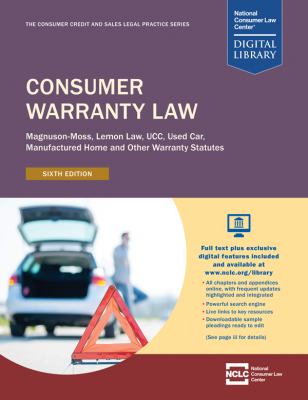A redlined version of the Rule, showing the November changes, is found at the online version of Consumer Warranty Law Appx D. That appendix also includes both the old and new versions of the Rule's required sticker (known as the buyer's guide).
This article explains how the new amendments strengthen this disclosure, but the Rule still provides only limited assistance to the many consumers who purchase used vehicles “as is.” This article then lists 15 legal theories to challenge vehicle defects even when the vehicle is sold “as is.”
The New FTC Amendments
The FTC changes to the Used Car Rule go into effect January 27, 2017, but dealers can use their existing supply of sticker forms for an additional year.
The new rule adds a new requirement that must be disclosed on stickers affixed to all used cars for sale, directing consumers to obtain a vehicle history report and to check for open recalls. The sticker informs consumers that related information can be found at www.ftc.gov/usedcars and www.safercar.gov. Even more detailed information on summary vehicle history reports can be found at NCLC’s Automobile Fraud § 2.3 and for full reports from state registries at § 2.4.
The amendment changes the language on the sticker describing an “as is” sale. The old language arguably misstated the law by saying: “The dealer assumes no responsibility for any repairs regardless of any oral statements about the vehicle.” The language the FTC initially proposed in its new rule as a replacement would have been even worse: “The dealer is not responsible for any repairs, regardless of what anybody tells you.” After opposition from consumer groups, the language is now changed to “The dealer does not provide a warranty for any repairs after sale.” Since the Rule prohibits the dealer from making an “as is” disclosure when there is a warranty under state law, this is an accurate statement.
The new sticker also improves disclosures for service contracts and unexpired manufacturer warranties, increases Spanish language disclosure information, and adds air bags and catalytic converters to the sticker’s list of major defects that can occur.
Private Remedies for Rule Violations
While there is no private right of action for violation of an FTC Rule promulgated under the FTC Act, there is a private right of action for actual damages and attorney fees for violation of an FTC Rule promulgated under the Magnuson-Moss Warranty Act. See NCLC’s Consumer Warranty Law § 2.7. Interestingly, as explicitly pointed out by the original rule’s statement of the authority under which it was adopted) and in the Supplemental Information to the new rule amendments, the Used Car Rule was promulgated under both statutes. (The supplemental information states that certain of the new amendments were promulgated under the FTC Act only but other provisions are pursuant to the Magnuson-Moss Warranty Act). As a result, many violations should be actionable under the Magnuson-Moss Warranty Act. Id. § 15.6.9.2.
As to violations related to portions of the rule promulgated only pursuant to the FTC Act, violations should also be violations of a state UDAP statute, prohibiting deceptive practices, and offering strong private remedies. Id. § 15.6.9.1.
15 Ways to Defeat an “As Is” Disclaimer in a Used Car Sale
Many used cars, particularly lower end cars, are sold “as is,” and dealers like to claim that this immunizes them from all consumer claims. The law cannot be more different. Here is a listing of 15 ways to litigate a used car case even when the vehicle is sold “as is.”
- A car sold “as is” still has a warranty of good title--that the transfer is rightful, and that the car is delivered free from liens--unless excluded by specific language or by circumstances that give the buyer reason to know that the seller may not have clear title. Id. § 15.2.
- Express warranties cannot be disclaimed. Express warranties can be created by representations or even descriptions on sales documents, the odometer reading, and oral statements. See § 15.3.
- Federal law provides that a dealer that “makes any written warranty” or “enters into a service contract” cannot sell a car “as is.” § 15.4.3.
- Used car lemon laws in Hawaii, Massachusetts, Minnesota, New Jersey, New York, and Rhode Island generally eliminate “as is” sales and provide strong consumer remedies. § 15.5.2.
- Every state has enacted a new car lemon law that may provide remedies not just to new cars, but also to demonstrators or for fairly recently manufactured used cars. § 15.5.3.
- Minimum standards for used cars are created by statute in Arizona, California, Connecticut, Illinois, Maine, Nevada, New Mexico, and Pennsylvania. § 15.5.4.
- California, the District of Columbia, Kansas, Louisiana, Maryland, Massachusetts, Minnesota, Mississippi, Oregon, and West Virginia all prohibit disclaimers of implied warranties (including “as is” sales) for used cars and other consumer goods. § 15.5.5.
- State vehicle inspection laws in 13 states require an inspection shortly after a used car sale and may provide a remedy even in an “as is” sale where the vehicle does not pass inspection. § 15.5.6
- All in all, 32 states have statutes that limit “as is” sales in some fashion. § 15.5.7.
- Acceptance of a vehicle can be revoked where there is a nonconformity that substantially impairs its value. § 15.7.
- State UDAP statutes in every state apply to oral or written misrepresentations or the failure to disclose defects or a wreck, flood, or other salvage history, even where a vehicle is sold “as is.” § 15.8.3.
- Common law tort claims such as fraud, negligence, strict liability, and good faith duty to disclose known defects, apply despite the “as is” sale. See § 15.8.4 and § 15.8.5.
- The federal odometer statute, including $10,000 minimum damages and attorney fees applies, despite the “as is” sale, to odometer misrepresentations, mis-disclosures or tampering. § 15.8.6.
- Laundered lemons (undisclosed re-sale of vehicle previously returned as a lemon) are subject in most states to a special statute that applies despite the “as is” sale. § 15.8.7.
- Other automobile fraud statutes provide consumers with a remedy where prior physical damage or prior use is not disclosed, or where air bags are not properly replaced, even when a car is sold “as is.” See NCLC’s Automobile Fraud § 7.2.



